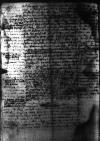Gratae nobis fuerunt tuae ⌊⌋, ex quibus mentem tuam, quid de his tumultibus, qui nunc passim in ⌊Germania⌋ contra ⌊caesarem⌋ per quosdam inoboedientes et rebelles subditos excitati sunt , sentias , et quid hactenus in bonis litteris profeceris, cognovimus. Nec consilium et propositum tuum improbamus, quod his motus reditu in patriam tuis rebus consulueris, in qua existens, si quidquam tuis studiis prodesse poterimus, non deerit tibi ad hanc rem opera et propensio nostra.
Bene vale et ⌊parentem tuum⌋, veterem amicum nostrum , nostro nomine salvere iube.
